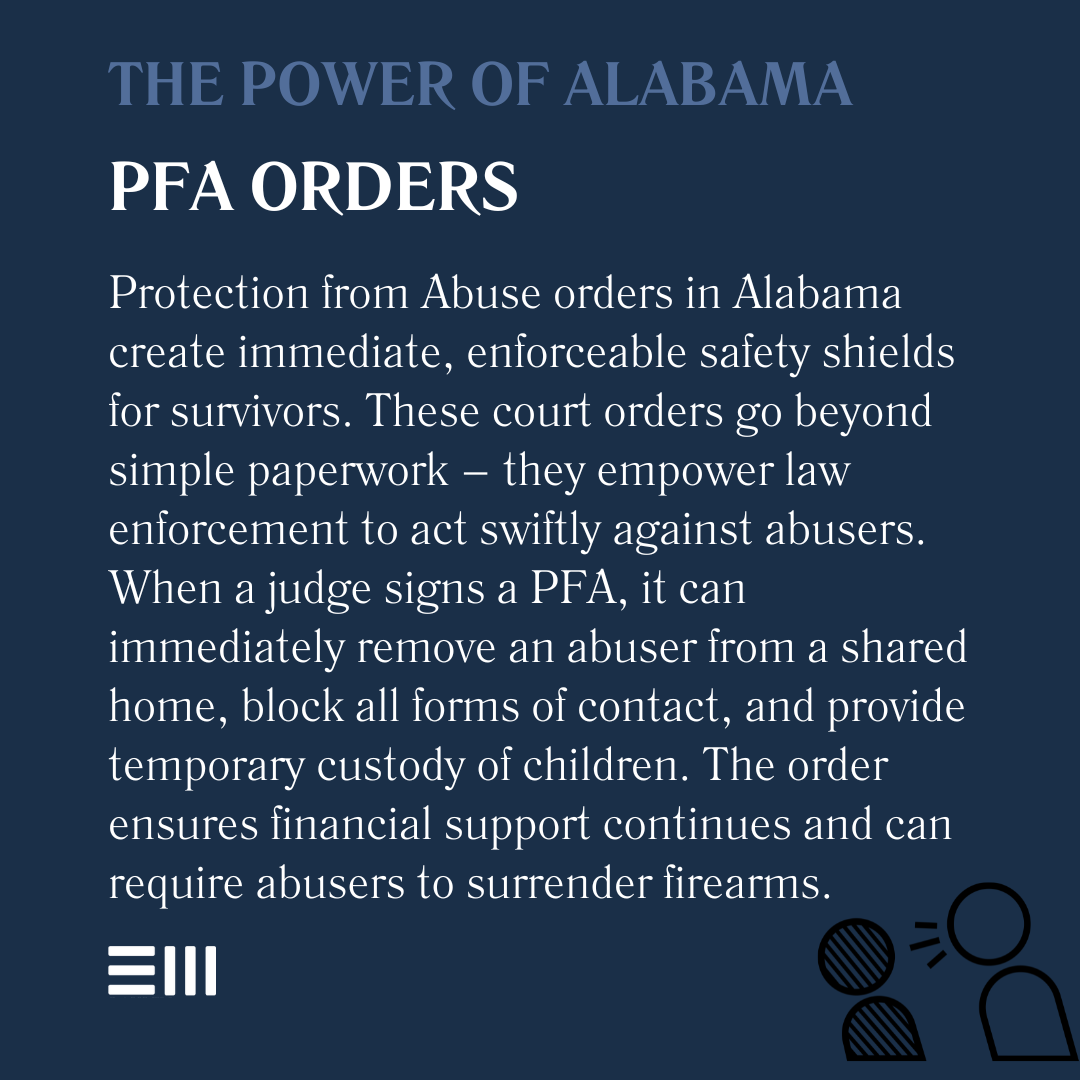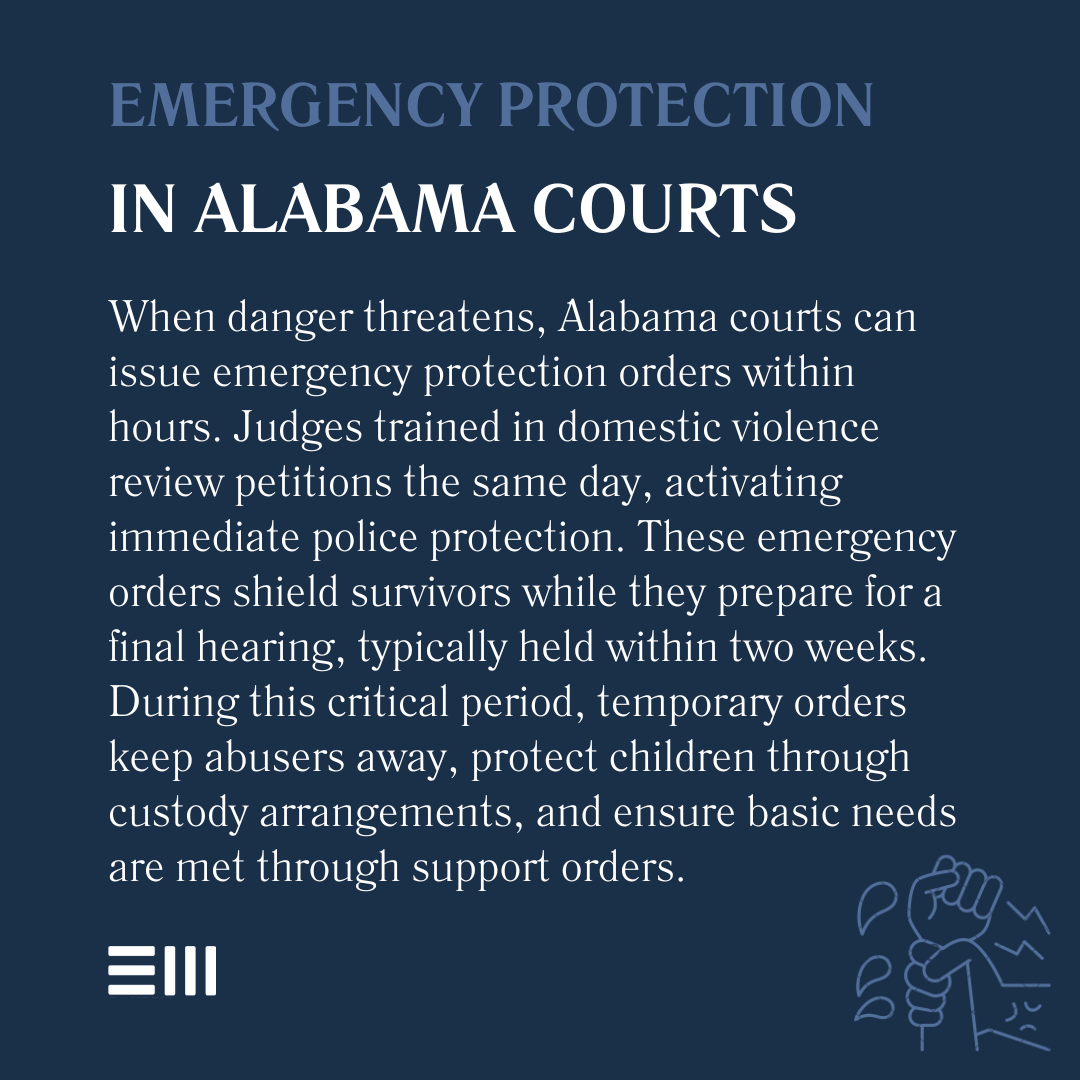Dawn breaks over another Alabama morning. In a courthouse in Mobile, a mother of three gathers her courage to file paperwork that might save her life.
In Birmingham, a judge reviews an emergency petition, knowing that every minute matters. In Huntsville, police officers serve a protection order, standing guard while someone collects their belongings to start anew.
Across Montgomery, domestic violence advocates prepare for another day of helping survivors navigate the legal system.
These scenes unfold every day across Alabama's sixty-seven counties, where Protection from Abuse orders serve as lifelines for those facing domestic violence.
Behind every PFA petition lies a story of survival. Some seek protection after years of escalating abuse, others after a single incident that shattered their sense of safety.
They come from every walk of life—teachers, doctors, factory workers, stay-at-home parents. They file on behalf of themselves, their children, elderly parents, or other family members.
Some arrive with detailed documentation spanning years; others bring only their testimony and desperate need for safety.
Understanding PFA Orders in Alabama's Legal System
The moment you file for a Protection from Abuse order, Alabama's legal system activates a powerful set of protections.
PFA orders are more than legal documents—they create enforceable boundaries backed by law enforcement and court authority.
Their effectiveness shows in the numbers: victims with protection orders report 80% fewer violence incidents in the following year. These orders represent Alabama's commitment to breaking the cycle of abuse through immediate, enforceable legal intervention.
A PFA order can require the following:
- Immediate removal of the abuser from a shared residence, including temporary exclusive possession of the home;
- Prohibition of any contact, including phone calls, text messages, emails, social media, or communication through third parties;
- Temporary custody of children and specific visitation arrangements that prioritize safety;
- Emergency financial support, including temporary child support and spousal maintenance;
- Surrender of firearms and prohibition of firearm possession during the order's duration;
- Police escort for property retrieval, ensuring safe access to necessary belongings;
- Mandatory counseling programs, including anger management and substance abuse treatment; and
- Payment of medical expenses related to abuse incidents and ongoing treatment.
These protective measures create immediate safety and stability for victims seeking protection. Courts can tailor these orders to address specific safety concerns and circumstances, recognizing that each situation requires individualized attention and protection strategies.
Navigating the Filing Process in Alabama Courts
Alabama courts prioritize PFA petitions to ensure rapid response to abuse. The filing process balances accessibility with thoroughness to protect victims while maintaining legal integrity.
Understanding each step helps ensure successful petition filing and maximum protection under the law.
Required steps include:
- Completing the petition at your local courthouse, with forms available in multiple languages;
- Providing specific details about abuse incidents, including dates, locations, and witnesses;
- Identifying the relationship with the abuser and documenting the nature of shared residency;
- Listing any shared children, including current custody arrangements and safety concerns;
- Documenting previous protection orders from any jurisdiction;
- Specifying requested protections based on individual safety needs;
- Signing the petition under oath before a court clerk or notary; and
- Attending the court hearing prepared with evidence and witnesses.
The court system waives filing fees for those unable to pay, ensuring financial barriers never prevent access to protection. Local victim advocates often assist with paperwork completion, helping ensure accurate and complete documentation of abuse history and current safety needs.
Emergency Orders and Hearings
When immediate danger threatens, Alabama courts can issue emergency ex parte orders without waiting for a full hearing. These orders provide instant protection while preparing for the final hearing.
Courts understand that waiting even a few days for protection can put lives at risk.
The emergency process involves:
- Same-day review of petitions by judges trained in domestic violence dynamics;
- Immediate service to law enforcement through statewide databases;
- Rapid notification of the abuser through certified law enforcement channels;
- Temporary custody arrangements protecting children from exposure to violence;
- Quick scheduling of final hearings within statutory timeframes;
- Emergency relocation assistance coordinated with local shelters;
- Immediate firearms restrictions enforced by local authorities; and
- Temporary support orders ensuring basic needs are met.
Emergency orders remain valid until the court holds a final hearing, typically within 14 days. This time allows both parties to prepare for the full hearing while maintaining victim safety through temporary protections.
Enforcement and Violations
Protection orders carry serious legal weight, and Alabama law enforcement responds swiftly to violations. Understanding enforcement helps victims maximize their protection.
Violation consequences include:
- Immediate arrest of violators;
- Criminal charges and prosecution;
- Jail time up to one year;
- Substantial fines;
- Enhanced penalties for repeat offenses;
- Mandatory anger management;
- Extended order duration; and
- Additional protective measures.
Law enforcement prioritizes PFA violation calls, treating them as serious threats to victim safety. Many departments maintain specialized domestic violence units.
Common Questions About Alabama PFA Orders
Seeking protection raises many questions about rights and procedures.
Here are answers to help you understand the PFA process in Alabama.
How Long Does a PFA Order Last?
Final orders typically last one year but can be extended based on continuing safety concerns.
What Proof Do I Need to Get a PFA?
Courts consider police reports, medical records, photographs, threatening messages, and testimony when evaluating PFA requests.
Can I Get a PFA for My Children?
Parents or legal guardians can request PFA orders to protect minor children from abuse.
Will My Address Stay Private?
Courts can seal address information and employ confidentiality programs to protect victim locations.
How Soon Can I Get Protection?
Emergency orders can be issued the same day you file, often within hours.
What if the Abuser Fights the Order?
Courts hold hearings where both parties can present evidence, but temporary orders remain in effect until the final decision.
Take Your First Step Toward Safety
Your protection matters, and immediate help is available. Our experienced attorneys understand the urgency of abuse situations and can help you secure a Protection from Abuse order today.
Contact us now for immediate assistance. Your consultation is completely confidential, and we can meet in a secure location.
Don't wait for the next incident—let us help you create legal protection that puts your safety first.


